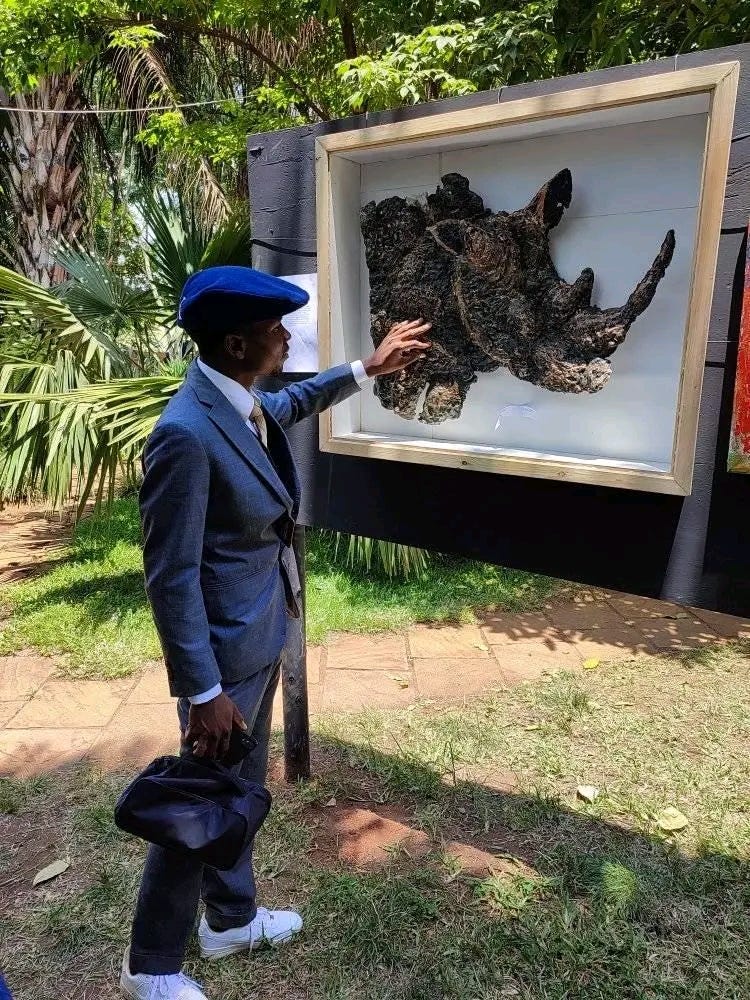Turning Trash into Treasure: Malawian Artist Crafts Stunning Sculptures from Plastic Waste
Aged 28, Chisomo Lifa is a trailblazing modern artist who has been crafting paintings and sculptures out of plastics since 2015
LILONGWE, Malawi-Plastic pollution is one of the most troubling environmental challenges in the new age, with thin plastics ending up in landfills, water ways, lakes and rivers, thereby choking biodiversity and human lives, writes Dingaan Mithi.
However, a youthful sculptor, painter and chemistry enthusiast is turning tables, converting plastics into artistic pieces.
Aged 28, Chisomo Lifa is a trailblazing modern artist who has been crafting paintings and sculptures out of plastics since 2015 after noting the serious problem of plastic pollution across the urban areas of Lilongwe City and many parts of Malawi.
“I am an artist who believes I can contribute towards combatting plastic pollution and make the country greener. Plastics can stay in the environment for over 200 years but we must find a solution. I am also a fanatic of chemistry and it is easy to turn these plastics into fuel and artistic pieces which I am doing already,” Lifa explains.
Lifa produced his first Rhino sculpture from plastics and made a good amount of money from it.
He states that foreign tourists and expatriates working in Malawi from Britain, United States of America and other European countries have bought much of his sculptures and paintings than Malawians.
However, he is concerned that the battle against a total ban on thin plastics is being derailed by politics and the tactics of plastic manufacturers who are finding various ways of circumventing the legislation in place.
“Malawi must find a sustainable solution to deal with thin plastics. Yes we have a law in place but you know plastics are highly politicized and makes it hard to tackle the environmental problem. I wanted to start a company to turn plastics into fuel but I was discouraged with requirements at Malawi Energy Regulatory Authority (MERA),” he said.
Recycling can help to ameliorate plastic waste problems, but it is not the silver bullet.
International consensus has moved from reliance on recycling to minimizing the use of plastics.
One after another, countries are implementing policies to reduce the production and use of plastic products.
These range from taxes and charges to discourage production, to outright bans, or a combination of the two.
So far, 26 African countries have introduced bans on plastic, more than half of these since 2014, and the most recent being Tanzania in April 2019.
Since 2014, more than 150 municipalities in the United States have implemented plastic bag bans or levies.
In March 2019 the European Parliament approved a law banning a wide-range of single-use plastic items by 2021 and also agreed to collect and recycle 90% of beverage bottles by 2029. In response to consumer demand, retail businesses are also increasingly introducing policies to reduce plastic packaging.
Rwanda provides an excellent example of progress in this area.
The production, use, importation and sale of all polyethylene bags was banned in 2008, and vigorously enforced.
The country also introduced a monthly community service day and has used this to involve its population in regular clean ups. The country is now the cleanest in Africa.
Lifa observes that many African countries have made significant strides to address plastic pollution and hopes Malawi can follow in those steps if there is more political will and greater involvement of investors and companies to turn plastics into fuel and other products to enhance a circular economy.
A United National Development Program (UNDP) commissioned study on the impact of thin plastic on Malawi’s environment shows that the country produces up to 75,000 tonnes of plastic each year, with 80% of that being single use plastic.
The report reveals that single use plastic pollution affects the environment, biodiversity, and water resources.
On his part, Lifa believes that artists must join the war against plastics and are part of the solution, in spite of many challenges.
“We must understand that plastics harm animal life, lakes, rivers and biodiversity where humans depend on to survive. For me, turning plastic waste into paintings and sculptures is a huge artistic innovation. I will not relent, I am still keeping my dream to establish a company to recycle plastics into fuel and other greener solutions. As artists, we should not just be complaining that government is failing the arts sector but we can also be a solution,” stresses Lifa.
Lifa also notes that government must promote innovators and create a conducive environment for artists by creating a national arts gallery, boost investor confidence and technological solutions to tackle plastics.
It must take advantage of the Global Plastics Treaty that is still under negotiations as a starting point.
Globally, 430 million metric tons of new plastics are produced every year. And at this rate, that will triple by 2060.
Sixty percent of plastics have lifetimes of less than five years, and only nine percent have been recycled. Microplastics penetrate human bodies and pollute water, air, and soil.
In 2023, in Nairobi, Kenya the Intergovernmental Negotiating Committee on Plastic Pollution (INC) convened its third meeting with delegates from more than 160 countries and hundreds of observer organizations.
Mandated by the United Nations Environmental Agency 5/14 resolution, the INC met previously in Uruguay and France, and will convene twice more to complete negotiations by the end of 2024 for a global plastics treaty.
Lifa hails Malawi’s regulations that ban the importation, manufacture, trade, and commercial distribution of plastic bags/sheets that are less than 60 micrometers in thickness based on the Environmental Management (Plastics) Regulations of 2015 but calls for more political commitment and financing to address the plastic pollution crisis.




